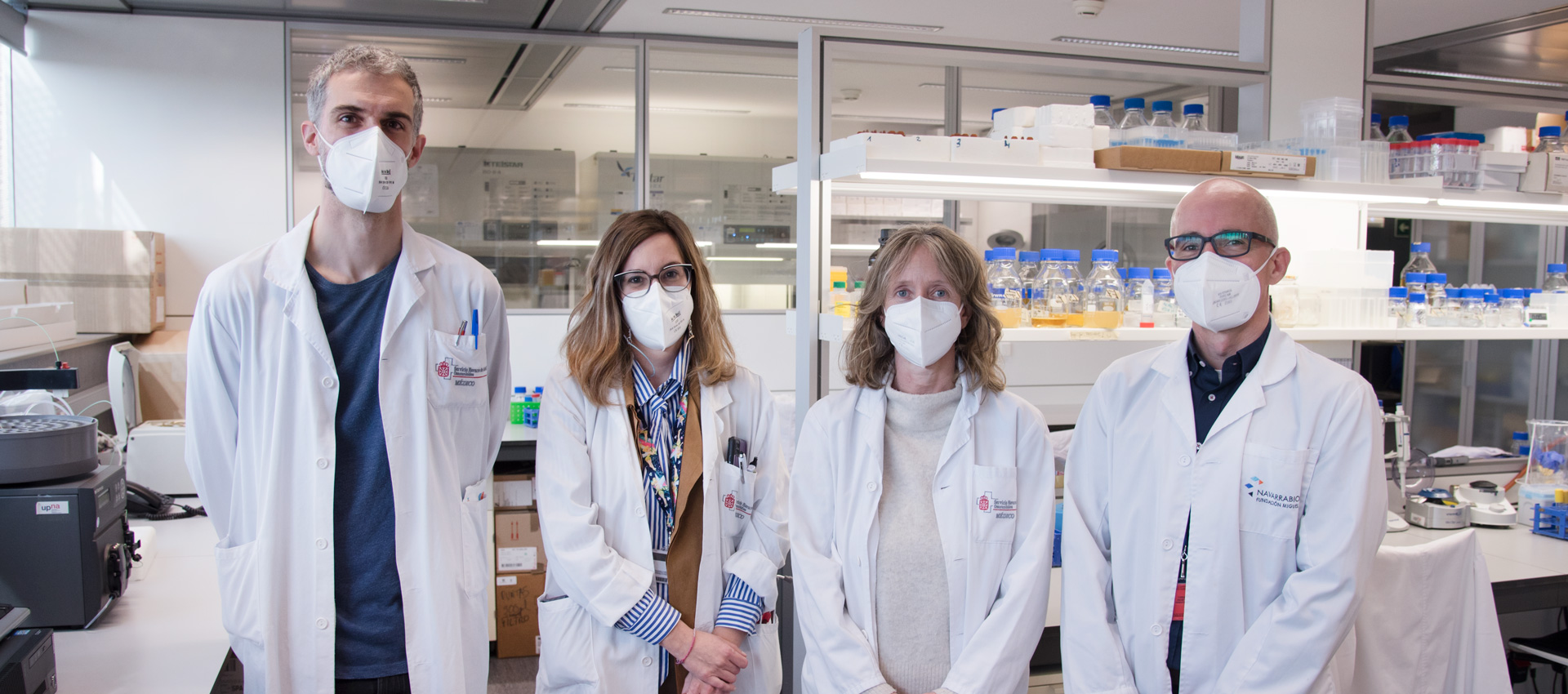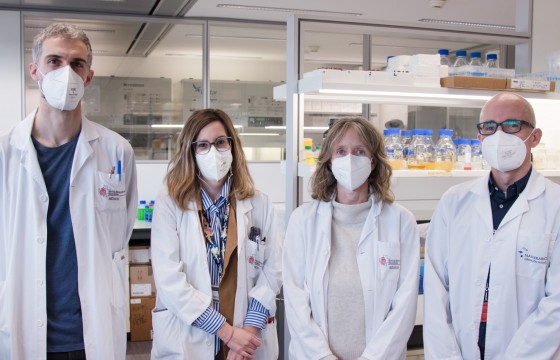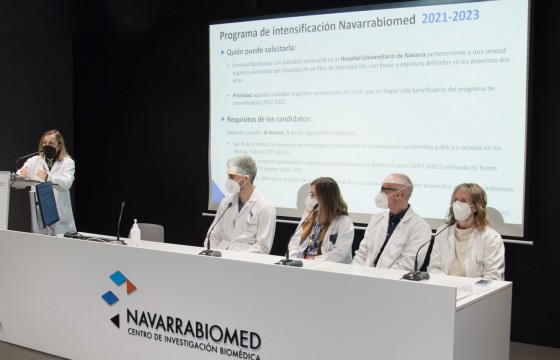
Intensification, key to favour translational research
Bridging the distance between the scientific research and clinical practice is one of the great challenges to advance in more personalized and effective treatments for the patient. Precisely, this is the goal of the 'intensification model’, an opportunity offered by Navarrabiomed to healthcare professionals in the public system to facilitate their involvement in research activities.
In order to introduce the II Call for the Navarrabiomed-“la Caixa” Foundation Intensification Program to the medical staff, on February 10th there was a talk-colloquium in which doctors of the HUN shared their experience as intensified doctors.
Marisol Fragoso, Management Director of Navarrabiomed, presented the program as a tool to encourage, promote and consolidate research activity performed in the different clinical services of the University Hospital of Navarra. “The purpose of the call is to be able to release medical staff from their healthcare activity by 50% so that it allows them to dedicate time to research”, Fragoso explained. In this way, the intensification model, in addition to introducing research in the hospital, promotes patient-oriented translational research and contributes to the formation and consolidation of emerging groups.
To deepen in this topic, a colloquium was organized with four doctors of the HUN: Eduardo Albéniz (digestive specialist), Josune Hualde (paediatrics), Ander Ernaga (endocrine specialist) and Maite Mendioroz (neurology). They all agreed that researching encourages to be updated and trained in the latest advances, helps to establish work and service standards and stimulates critical thinking. Accordingly, it improves the profile of the unit and the hospital. In turn, promoting research participation in the hospital allows integrating medical information collected in patient consultation in research projects in addition to testing new treatments in the clinical setting.
However, not all healthcare professionals are familiar with the intensification model. Eduardo Albéniz was one of them: “I didn't know about this, from the Navarrabiomed Methodology Unit they encouraged me to apply for the call in order to have more time to be able to investigate”. In the case of Ander Ernaga, the initiative came through the Nagen program, funded by the Government of Navarra in the call for strategic projects. “The option of studying the application of the genome within a specific disease, familial hypercholesterolemia, was raised. The idea was discussed and Dr. Juan Pablo Martínez and I decided to take the step and start the project”. Both of them showed the different ways to enable intensification, either through a call to promote general lines of research - as is the Navarrabiomed program-, or aimed at conducting a specific activity.
In one way or another, the research activity generates a very important impact on healthcare and on people's desire to learn more. Proof of this as noted by Mendioroz is the data provided during the session: “the number of people with interest in the doctoral thesis in our service has increased, four research groups have been created and currently we have three active research projects in the national call of the ISCII”. For their part, Albéniz and Ernaga pointed out the creation of research groups based on thematic units and the generation of a monographic consultation service for patients with hypercholesterolemia, respectively. In addition, Hualde highlighted the progress on a day-to-day basis referring to the program he leads, Nagen Pediatrics: “the combination of these genomic and clinical sources of information allows us in many cases to predict the causes of some diseases, a more accurate diagnosis or to alter guidelines in the management of each case that are specifically adjusted to patient characteristics, thus customizing medicine”.
Marisol Fragoso also wanted to highlight another result that confirms the relevance of the Navarrabiomed intensification program: “we have achieved that our researchers are more competitive, professional qualification has been demonstrated when successfully attracting funds for research in national competitive calls, such as the Strategic Health Action of the Carlos III Health Institute”.
The discussion also served to address certain obstacles faced by intensified clinical professionals. The learning curve is, perhaps, one of the most relevant. They also mentioned the need to have a feasibility plan that allows the continuity of the projects over time. As a positive aspect, they insisted on the real possibility of combining research and clinical practice, and provided some keys to make it possible. In this regard, they stressed on Navarrabiomed's proximity relative to the hospital, an aspect that facilitates the balance between the two areas and allows one hundred percent involvement in research.
In conclusion, intensification is well worth it for everyone, because you learn, share, experiment with your own knowledge and take a very interesting path. “You realize that you apply scientific thinking in the clinical setting and, somehow, you break the day-to-day dynamics, it helps you think better”, Mendioroz pointed out. "In fact, what is being favoured is that translational research takes place in the context of the health field”, concluded Fragoso, and encouraged attendees to participate in the II Call for Intensification that ends next February 28th.
Navarrabiomed currently has 19 Own research units and 28 partner groups composed of more than 250 clinicians from public centres, including the University Hospital of Navarra, the network of Primary Health Care centres and the Institute of Public and Occupational Health of Navarra.
More information about the call for the Navarrabiomed-“la Caixa" Foundation Intensification Program, candidate requirements and how to apply, at this link.



